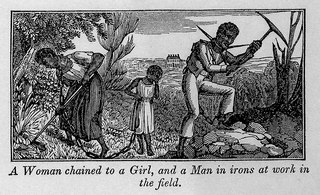
Historiography is the study of the methods of historians in developing history as an academic discipline, and by extension is any body of historical work on a particular subject. The historiography of a specific topic covers how historians have studied that topic by using particular sources, techniques, and theoretical approaches. Scholars discuss historiography by topic—such as the historiography of the United Kingdom, that of WWII, the pre-Columbian Americas, early Islam, and China—and different approaches and genres, such as political history and social history. Beginning in the nineteenth century, with the development of academic history, there developed a body of historiographic literature. The extent to which historians are influenced by their own groups and loyalties—such as to their nation state—remains a debated question.

The Reconstruction era was a period in United States history following the American Civil War, dominated by the legal, social, and political challenges of abolishing slavery and reintegrating the former Confederate States of America into the United States. During this period, three amendments were added to the United States Constitution to grant equal civil rights to the newly freed slaves.

Edward Hyde, 1st Earl of Clarendon, was an English statesman, lawyer, diplomat and historian who served as chief advisor to Charles I during the First English Civil War, and Lord Chancellor to Charles II from 1660 to 1667.

The historiography of the French Revolution stretches back over two hundred years.

African American history started with the arrival of Africans to North America in the 16th and 17th centuries. Former Spanish slaves who had been freed by Francis Drake arrived aboard the Golden Hind at New Albion in California in 1579. The European colonization of the Americas, and the resulting Atlantic slave trade, led to a large-scale transportation of enslaved Africans across the Atlantic; of the roughly 10–12 million Africans who were sold by the Barbary slave trade, either to European slavery or to servitude in the Americas, approximately 388,000 landed in North America. After arriving in various European colonies in North America, the enslaved Africans were sold to white colonists, primarily to work on cash crop plantations. A group of enslaved Africans arrived in the English Virginia Colony in 1619, marking the beginning of slavery in the colonial history of the United States; by 1776, roughly 20% of the British North American population was of African descent, both free and enslaved.

Hayden V. White was an American historian in the tradition of literary criticism, perhaps most famous for his work Metahistory: The Historical Imagination in Nineteenth-Century Europe (1973/2014).
The Redeemers were a political coalition in the Southern United States during the Reconstruction Era that followed the American Civil War. Redeemers were the Southern wing of the Democratic Party. They sought to regain their political power and enforce White supremacy. Their policy of Redemption was intended to oust the Radical Republicans, a coalition of freedmen, "carpetbaggers", and "scalawags". They were typically led by White yeomen and dominated Southern politics in most areas from the 1870s to 1910.

Mikhail Ivanovich Rostovtzeff, or Rostovtsev, was a Russian historian whose career straddled the 19th and 20th centuries and who produced important works on ancient Roman and Greek history. He was a member of the Russian Academy of Science, the American Academy of Arts and Sciences, and the American Philosophical Society.
Alfred Bert Carter Cobban was an English historian and Professor of French History at University College, London, who along with prominent French historian François Furet advocated a classical liberal view of the French Revolution.

The historiography of Scotland refers to the sources, critical methods and interpretive models used by scholars to come to an understanding of the history of Scotland.

This is a selected bibliography of the main scholarly books and articles of Reconstruction, the period after the American Civil War, 1863–1877.
Benjamin Arthur Quarles was an American historian, administrator, educator, and writer, whose scholarship centered on black American social and political history. Major books by Quarles include The Negro in the Civil War (1953), The Negro in the American Revolution (1961), Lincoln and the Negro (1962), and Black Abolitionists (1969). He demonstrated that blacks were active participants in major conflicts and issues of American history. His books were narrative accounts of critical wartime periods that focused on how blacks interacted with their white allies and emphasized blacks' acting as vital agents of change rather than receiving favors from whites.
Leonard Monteath Thompson was Charles J. Stillé Professor of History Emeritus at Yale and director of the former Yale Southern African Research Program. He is well known for his work on the formation of the Union of South Africa and the two-volume The Oxford History of South Africa, a collaboration with N.M. Wilson., and has written and edited many books, including The Political Mythology of Apartheid, The Frontier in History, A History of South Africa, and South African Politics, all published by Yale University Press.

The historiography of the British Empire refers to the studies, sources, critical methods and interpretations used by scholars to develop a history of the British Empire. Historians and their ideas are the main focus here; specific lands and historical dates and episodes are covered in the article on the British Empire. Scholars have long studied the Empire, looking at the causes for its formation, its relations to the French and other empires, and the kinds of people who became imperialists or anti-imperialists, together with their mindsets. The history of the breakdown of the Empire has attracted scholars of the histories of the United States, the British Raj, and the African colonies. John Darwin (2013) identifies four imperial goals: colonising, civilising, converting, and commerce.
The historiography of the United States refers to the studies, sources, critical methods and interpretations used by scholars to study the history of the United States. While history examines the interplay of events in the past, historiography examines the secondary sources written by historians as books and articles, evaluates the primary sources they use, and provides a critical examination of the methodology of historical study.
Charles Iain Hamilton is a naval historian at the University of the Witwatersrand, Johannesburg, South Africa.

The History of the Rebellion by Edward Hyde, 1st Earl of Clarendon and former advisor to Charles I and Charles II, is his account of the Wars of the Three Kingdoms. Originally published between 1702 and 1704 as The History of the Rebellion and Civil Wars in England, it was the first detailed account from a key player in the events it covered.
Richard Bruce Wernham, was an English historian of Elizabethan England. After his death The Times called him "the leading historian of English foreign policy in the 16th century".
The historiography of the United Kingdom includes the historical and archival research and writing on the history of the United Kingdom, Great Britain, England, Scotland, Ireland, and Wales. For studies of the overseas empire see historiography of the British Empire.
Iain Robertson Smith was emeritus reader in history at the University of Warwick. He was a specialist in the history of South Africa and the South African War in particular. Smith was a member of Council of The Historical Association from 1980 to 1995 and editor of the New Appreciations in History series.











